 As I mentioned in my previous post, I reach out to my friend and fellow playwright, Kia Corthron to see if she would contribute to my ongoing blog series about Diversity and Inclusion, which can be read here and here. She was excited about the series and wanted to share an article that she had written for the Dramatist Guild's The Dramatist magazine called, The Ethics of Ethnic, which brilliantly addresses the issue of artistic authority. In it, Kia asks colleagues to participate because she felt "there were as many different answers to my questions about artistic authority as there were playwrights." In Part Three of the Artistic Authority Blog Series, we will be hearing from playwrights Dael Orlandersmith, J.T. Rogers, Najla Saïd, Betty Shamieh, Stew, Caridad Svich, Naomi Wallace, Allison Warden, and Rhiana Yazzie. Of course, this article was originally printed in the Sept/Oct 2010 issue of The Dramatist, the journal of the Dramatist Guild of America, Inc. Please enjoy! 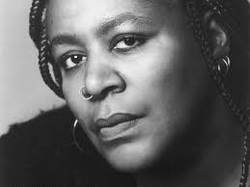 DAEL ORLANDERSMITH The role of art / any art form means that we as the writers have to be mental and emotional travelers. Many groups interest me and that is UNIVERSAL, and I feel UNIVERSALISM is a good thing / The problem arises when someone writes about another culture/race/ethnic group and tries to speak FOR that group to that audience / as opposed to speaking TO an audience and by speaking FOR that group / They end up stereotyping. People are multifaceted and whatever group(s) one is drawn to / it is MANDATORY to find the HUMAN BEING(S) within that culture and look at the INDIVIDUAL(S)’ story(ies) within the story the writer is telling. There is a writer/performer who has a made a living playing characters outside of that writer/performer's own race / There is nothing wrong with this but as stated above, this person tries to SPEAK FOR the races and by doing so not only does this person infantilize people / this person shows his/her bias. The work has sound bites but the people are not fully realized. For many people who do not step out of their own comfort zone / this person's work is seen as “DARING.” In ref to the people that are delineated in the work the ACTUAL GROUPS themselves / it's patronizing and non-informative. I wrote a play a few years ago called Rawboys which was about an Irish family in south London. The play was beset with many problems and one critic opened her VERY racist review by saying “there are enough self-hating Irish / they don't need a BLACK WOMAN to jump on the cudgel for them.” People HERE in the States thought the language of the play was too much. Ironically I did a reading of it in Ireland where the IRISH thought it fine and many in the audience told me that I wrote “good stuff” and nailed the colloquialisms. I do find as a woman and as a black woman writer the rules are not the same as it is for white writers male and female. Whites have written about ALL people of color but yet when the reverse happens / indeed the response is NOT the same. I write about ALL kinds of subjects and all kinds of people - not just black people. After writing Yellowman I think the expectation was to keep writing a certain kind of way. I cannot / will not do that / To do that means NOT to travel / learn – it means death to a writer. Dael Orlandersmith is a performer/writer of plays and poetry. Her play Yellowman was a finalist for the Pulitzer Prize. She lives in New York City.  J. T. ROGERS Playwriting is in the details. So when I write a character who is a Rwandan pediatrician living in Kigali, or create both a devout Pashtun Afghan mujahideen commander fighting against the Soviets and the KGB officer trying to stop him, I have to make sure I know what I'm talking about. After doing research, I make up my story, and then – most crucially – before I send the play out into the world, I have it vetted by people who are as close to those I've created as possible. In the first case, I poured over the play with a Rwandan doctor who had lived through the Genocide of 1993; in the latter, I spent hours running things by both former intelligence officers and Afghan civilians who were involved with the Afghan-Soviet War. In every case, the people I talk with are generous with their time and their comments; their criticism is invaluable. But the one thing these non-theater folk never ask is, Who do you think you are to write about me? In fact (so far, mind you) the universal response has been the opposite: I'm so glad you're writing about this and taking the time to try and do it right. The story itself quickly becomes the subject of our conversation. Because an exciting, thought-provoking tale is something that interests everyone. J. T. Rogers is the author of The Overwhelming, set in Kigali, Rwanda, which has been produced in London, New York, and around the world. His new play, Blood and Gifts, set in Pakistan and Afghanistan, premieres at London's National Theatre in September. He lives in Brooklyn, New York. 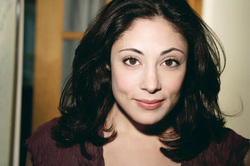 NAJLA SAID One of the greatest challenges that a writer must face is that of writing from the perspective of another human being. The character may be fictitious or real, the same sex, sexual orientation, race, age, social class, ethnicity as the writer – or not. In my opinion, "ethnicity" is in the same category as all of the others I've mentioned. The artist's job is to create realistic characters whose truths and experiences are believable, period. This can be tricky business, especially if the writer sets out to tell the story of someone of a marginalized or underrepresented, misunderstood community. While I was writing my solo play, Palestine, about growing up Arab-American, a friend published his first novel. It was a first-person account of the harrowing childhood of a young African-American boy in the projects. When he first approached agents and editors with his manuscript, more than one person suspected him of not being the author. He was good looking, clearly from an upper-middle class background, and white. It seemed impossible that he could have written the story so delicately; so precisely and believably. My friend’s experience got me thinking about the subject of who is "allowed" to write about what and why. My play was personal, and so even though I was bold in voicing my “controversial” politics and frank in my descriptions of the apartheid I'd seen in Palestine, I was met with very little opposition. Many people who disagreed with my politics were able to connect with my experience, and listen to my point of view. But I wondered what would have happened if I had pretended the story was fiction? People might have said, “How could the daughter of a famous outspoken Palestinian have grown up speaking Yiddish and hanging out with Jewish people in NYC? That’s ridiculous! And she says her Arab family was Quaker and Baptist? That’s insane and far-fetched!!” I myself have sat in the audience of many a play about the Palestinian/Israeli conflict and grumbled about how the author has "no idea" what he or she is talking about because of the subtle inconsistencies and implausibility of the plot. But I have also sat in the audiences of such plays and been amazed to discover they weren’t written by an Arab. I think the issue is one of good, honest, thorough WORK, of talent, of sensitivity, of the playwright doing his/her homework and being open to critical suggestions as the draft is perfected. But the writer should be on top of all of these things whether she is writing about herself or about a transsexual from the farthest point on the earth. The only real "authority" there is, is the truth, and it is our job as writers to find the truth within the stories and the characters we create, and tell it. Najla Saïd is an actor and writer whose play Palestine premiered in New York in 2010. She lives in New York City and is currently working on a memoir. 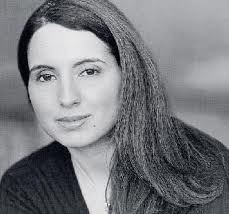 BETTY SHAMIEH It is essential to remember that when we are talking about race, what we are often talking around is the other “r” word. Resources. I don’t think that many artists of color would care if white writers depict characters of color in their plays – nor would white artists complain that they don’t have a shot at many grants – if more people felt that the economic realities of American theatre were not structured in a way that was unfairly stacked against them. I believe playwrights must have the freedom and space to portray whomever they wish. In fact, I feel it is profoundly important for us to imagine those who are different from ourselves, and I developed a workshop series called “Writing the Other” for American writers of Arab and Jewish descent to write characters with each other’s perspectives as part of an NEA grant. The real problem in American theatre is the content of the work that is being produced, not the color of the writers. We are living in a time of war. Currently, the plays that deal with the most pressing and hot-button issues of our era that receive productions on major American stages are primarily those that tend to reinforce stereotypes and, in the case of Middle Eastern characters, sound the drumbeats of war, despite the intentions of well-meaning and oftentimes left-leaning writers. If American stages were filled with gut-wrenching stories about how brutally and inhumanely the Vietcong leadership acted towards their own people during the Vietnam War, would that be neutral? So, is it neutral that the bulk of the American plays or British imports that get produced about the Middle East happen to highlight the horrors of living under the Taliban or Saddam’s regime? What would it mean if those same plays were instead set in Saudi Arabia or Egypt, countries which are currently our allies? Where are the stories that reflect the reality that the vast majority of Middle Easterners are not victims or perpetrators of unimaginably horrific violence, but simply human beings whose lives and concerns are not that different from those in the audience? Arab-American artists in every field, including myself, are currently primarily working in Europe. But, provocative white writers like Wallace Shawn have found it difficult to be produced in America as well. Why does that matter? Because we American playwrights are engaged in a cultural conversation. We are continually being influenced by and responding to the work of our peers. If our community of artists is not being exposed to the most challenging American voices of our time, we are all the poorer for it. Currently a playwright-in-residence at Het Zuidelijk Toneel of Holland, Betty Shamieh’s recent productions in translation include Again and Against (Playhouse Teater, Sweden), The Black Eyed (Theater Fournos, Greece), and Territories (European Union Capital of Culture Festival). She lives in New York City. 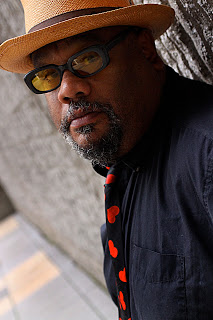 STEW I think artists have the authority to write about anything they want whether they know what the hell they are talking about or not. My favorite artists don’t attempt to frame reality as it “is” but rather as they see it and receive it. There should be no Art Laws. I would not want to live in a world where an artist had to be an expert on a race before he could depict that race in a work of art. For in that world, only anthropologists would be allowed to make plays. I think American playwrights should be ENCOURAGED to write IGNORANTLY about races beyond theirs. Screw the Art Police. For the uninformed view can be just as enlightening, compelling, valid and truthful as the so-called “informed” view. I even think plays written “outside” of one’s race could help race relations and raise consciousness levels (cue orchestra swell). Because what is just as enlightening as how a group views itself is how said group is viewed by so-called “outsiders.” Even the “wrong” “ill-informed” view is still a kind of truth. And that is why it is feared. Besides, we have reached a stage where minorities are both capable of and fully willing to create minstrelsy all by themselves without the help or coercion of “the white man” so at this point all bets are off. The European characters in Passing Strange were for the most part caricatures. I found this a perfectly valid way of depicting them and the kid’s experience of them in Europe. I don’t think caricatures strip characters of their humanity nor their truth. My approach mirrored the Youth’s tendency to “other” residents of whatever foreign environment he happened to be in. This is natural and it would be lame PC wrongness to pretend that we are not taken and enchanted by surfaces, by differences and by exoticness, before we get to the depth of the foreignness we are encountering, if we ever do. And Youth does eventually get beneath the surface of these individuals. I was also comfortable with caricatures because the kinds of people I was drawing (artists, radicals, etc) tend to “characterturize” themselves, if you will, before you even have the chance to do it to them. They very consciously want to live and be perceived by their ideals, which they wear on the surface of their bodies in their language and in their coded uniforms of cool. I prepared myself for accusations of taking the same reductive, stereotypical approach to white Europeans as all the white writers throughout the ages had towards people of color: using them primarily as conduits for humor. It might be a mistake to think that depth automatically tells us more about a character than the surface. The surface can be more telling than what is beneath it. In other words, there is a depth within the surface. And I admit I was thrilled to have both Germans and Dutch people tell me that I nailed the people I was depicting. Stew, resident of Berlin/Brooklyn, father of two, and co-creator of Passing Strange is still trying to figure out how he won the Tony for Best Book of a Musical. 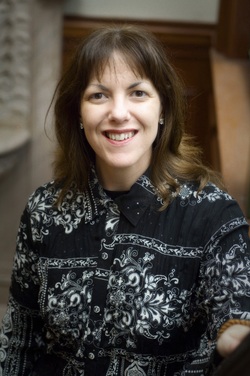 CARIDAD SVICH As a writer, I believe you're almost honor-bound to write outside your ethnicity, sex, gender and history or else why write at all? I always tell younger writers Write what you don't know, explore and write from your fears, wounds, areas of doubt. We go to the theatre to go outside ourselves, to embrace Others and others, to understand humanity a little better, and be startled and amused and sobered up/awakened to truths. Where does authority come from? It comes from looking at a subject straight in its heart and speaking his or her truths as profoundly as the imagination allows, and from this exploration discovering the confidence of translating the subject's experience to the spatial and temporal planes of the stage. I've written characters older, younger, transgender, bisexual, male, female, Latina/o, black, Anglo, Cuban, Spanish, Chilean, animal, or robot, in this time frame and in times long ago, etc. The fact that I'm of Cuban-Argentine-Spanish-Croatian background enters into everything I write. You can never escape who you are. Know where and who you're from, and you'll know, then, where you can go...and how far you can push yourself as an artist and thinker and observer and chronicler and poet of the human condition. The negative experiences have nearly always had to do with portrayals that are patronizing, victimizing, class-based, and/or rooted in stereotypes. I don't think, however, that writers within my multiple ethnicity are exempt from writing negatively about characters. I think it's too easy to castigate and blame in the ethnicity/identity-stakes game of authorship. An untruthful character, and of course this too depends on what the form and genre of the play is, will strike me negatively regardless of who writes it. One of my first major plays Any Place But Here, which is about two couples struggling to make ends and love meet in an economically-depressed northeastern town, was produced, in its first version, at INTAR in New York City directed by George Ferencz. (It was later produced at Theater for the New City under Maria Irene Fornes' direction in its revised version.) I never say in the script what the characters' ethnicities are. During the casting process we called in as open and inclusive a line-up of actors as one could think of. In the end, due to the many vagaries of casting, the original cast was Jessica Hecht, Peter McCabe, Jim Abele and Mimi Quinn. All wonderful actors but not one of them Latino/a. I know that the play caused some degree of alienation within the community for the play to be produced at INTAR. And it saddened me. Not because my ego was wounded, but rather because I wrote the play to say a little something about the difficulty people have communicating with each other and sustaining lives with each other when they feel trapped by circumstances of poverty, mis-education, loneliness and on the edge of emotional catastrophe. Can't we just talk to each other and see what little light we can glean from each others' lives? Caridad Svich is the founder of NoPassport theatre alliance and press. Her play The House of the Spirits, based on the novel by Isabel Allende, premiered (in her Spanish-language version) at Repertorio Espanol in New York City and its Latin American premiere was at Teatro Mori in Santiago de Chile this summer. It receives its regional premiere (in her English-language version) at Denver Theatre Center in fall of 2010. She is currently based in New York City. 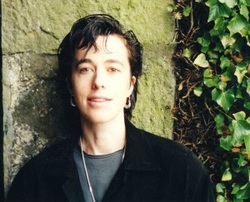 NAOMI WALLACE When I write outside of my whiteness, I am not speaking for anyone. I am instead trying to write history through characters, discovering their agency and dramatizing it on stage. What helped me in writing the black characters for Things of Dry Hours was firstly to acknowledge and examine mainstream American theater's legacy of peopling the stage with racist caricatures of Black Americans. White playwrights have too often created stereotypes of black people in order to impose a view of the world and its social relations that is as insidious as it is false. Secondly, I spent eight years, off and on, doing research for TODH. As the play came into being, inspired by Robin D. G. Kelley's brilliant book, Hammer and Hoe: Alabama Communists During the Great Depression, various artists had an important impact on its evolution. Recognizing that I was hampered (and still am) by my own blind spots (nurtured by a society that thrives on what James Baldwin calls “the lie of whiteness”) I sought out the wisdom and learning of others. Collaboration was the core that drove the project. The historians Tera Hunter and Peter Rachleff gave me critical feedback on early drafts. Kwame Kwei-Armah, who directed the play at Center Stage, urged me to rethink the ending. Director Israel Hicks highlighted the relationship between Cali and her father, Tice. Actor Karan Kendrick confronted my use of language in terms of cursing within a 1930's black family, and sent me a wonderful list of substitute swear words, my favorite being "Hot-toe-mali-no." Ruben Santiago-Hudson gave the play a multifaceted inner and outer world that I could never have imagined at its New York premiere at New York Theater Workshop. I have also written works for the stage that include Middle Easterners, Latinos, and Vietnamese. I don't know if I have the “authority” to create these characters. What I do know is that I am drawn to the still smoldering fires of resistance in American history, lit and stoked by many different people, working across lines of race and difference. In my journey as a playwright, I have been fortunate to have contact with the works of enormously intelligent minds. Alongside the writers and thinkers I have mentioned above, there is also Beth Cleary, David Roediger, Howard Zinn, Paula Giddings, W. E. B. Du Bois, bell hooks, Anne Braden and many others. Their words and texts are still my teachers. Whether I have been a worthy student I leave for others to judge. Naomi Wallace's work has been produced in the United Kingdom, Europe, the Middle East, and the United States. She was born in Prospect, Kentucky, and presently lives in North Yorkshire, England.  ALLISON WARDEN I believe that playwrights have the authority to write outside the bounds of their own ethnicity. I have encouraged a playwright friend of mine, a non-Native woman, to write a Native play, with complex Native characters. She's an amazing playwright and I would like to see more plays that focus on issues that our Native communities face and also more roles for Native actors. Ground rules that would work for playwrights would be for the playwright to write as honestly as she/he can, to trust their perspective and voice, and to also befriend a person of that ethnicity, a friend who can read the play during the process for technical authenticity. To ensure that the cultural aspects of the character reads as being authentic and believable. I've experienced being an actress reading a role for another Alaska Native group, a play written about Athabaskan people by a non-Native woman. It was an interesting experience, mostly negative. I felt that she had aspects of the play that didn't accurately portray the culture well, and it seemed at times to be a surreal mockery of the strength of the culture. I felt that her intentions were not entirely clear, and that she didn't take the time to talk to and listen to people of the culture to make sure that it wasn't outright offensive. I haven't written outside my own ethnicity, not yet. I would love to write characters outside my own ethnicity, specifically white, and also characters who are Alaskan Native, yet not Inupiaq. I would write these characters with complete conviction, pure intention and I would wait to consult with someone of the ethnicities until I have a solid draft that I could defend. I would talk to a person of that ethnicity, whom I trust, and ask questions – to make sure that I got the cultural components of the character right. At the end, I would trust my own voice and vision as a playwright and defend my authority to include these characters into my work. Allison Warden is an Inupiat performance artist and playwright who tends to focus on issues facing her communities of the Arctic. Recently her Time Immemorial, co-written with Yup'ik playwright Jack Dalton, was performed in June by Los Angeles' Native Voices at the Autry. She lives in Anchorage, Alaska. 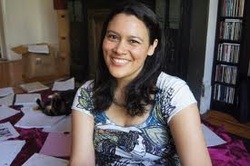 RHIANA YAZZIE You absolutely can write outside of your ethnicity if you have a strong and detailed understanding about who it is you're writing about. You need to be sure you're not retelling old narratives that weren't created by the ethnic group you're writing about and instead were created by the dominant society's imagination. I don't think it's ok to bring in token characters to make the main characters politically correct. Also avoid blanket statements that seem to “give you permission” to write about another ethnic group instead of the detail and time needed to truly bring your character to life. I come from thinking about this subject in terms of the way Native Americans are often handled in non-Native people's plays. Sometimes there is a Native character (who by the way won't ever use contractions) who is used to make the non-Native characters and situations seem more ironic or juxtaposed, or is used symbolically. That is not writing with authority, that's writing with an agenda. Often it seems when non-Native people write about Native Americans, they are somehow trying to work out in their minds that national code of genocide – and rationalizing their own historical relationship to it, good or bad, guilty or absolved. It's a complicated story to tell when 99% of all the images about Native people we see in the theatre were created by non-Native minds (beginning with The Tempest and ongoing with this year's hit Bloody Bloody Andrew Jackson) and most of those writers have never met Native people, nor spent time in Native communities, nor read work by Native authors. With all the information out there, there's no excuse to be misinformed. If you're writing about a group you don't know, talk to them first, and if you don't get answers you like from 9 out of 10, don't listen to the 1; listen to the 9. I consider writing about other tribes that are not my own writing outside of my ethnicity. So I take a lot of time to try and get things right and talk to real people rather than relying on books or the internet. Because as a Native person I see my story being told by other people so often, I try very hard not to do that myself when I am writing. And when people tell me I got something wrong I listen. I am probably my biggest critic when it comes to writing outside my own ethnicity. Rhiana Yazzie, a Navajo playwright based in the Twin Cities, is a 2010-2011 Playwrights Center Jerome Fellow. Her play Ady was produced by Minneapolis’ Pangea World Theater in July 2010. And there you have it! Such a wide range of brilliant responses from a dynamic group of talented playwrights. It's been such a pleasure getting to read this deeply moving and insightful article. Much appreciation goes to Kia Corthron, the Dramatist Guild of America, Inc., The Dramatist magazine and these extraordinary playwrights for allowing us to read their great thoughts.
0 Comments
Your comment will be posted after it is approved.
Leave a Reply. |
My BlogI'm a playwright, dramaturg, and teaching artist. It is here where you'll find my queries and musings on life, theater and the world. My posts advocate for diversity, inclusion, and equity in the American Theatre and updates on my own work. Please enjoy!
Categories
All
Archives
June 2020
Reading List
|
